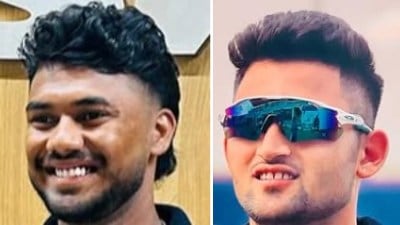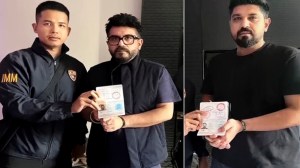Click here to follow Screen Digital on YouTube and stay updated with the latest from the world of cinema.
Why Chaleya isn’t Shilpa Rao’s best, even if it won a National Award
The National Award for an easy-to-forget song by Shilpa Rao should be seen as a representative, catch-up award for many previous significant others.
 Shilpa Rao’s win was long overdue.
Shilpa Rao’s win was long overdue.In the recently announced National Awards for 2023, when playback singer Shilpa Rao finally won her debut National Award for Best Playback Singer (Female) for Chaleya – the Anirudh Ravichander composition from Jawaan (2023) – it reminded one of all the times that she didn’t. For some of the most underrated and brilliant songs in her discography, built over almost two decades.
The win for Chaleya, a breezy track produced with mass appeal that got considerable runtime on radio and television, is less a win for the song and more a belated acknowledgement for a relatively undervalued voice. We are happy to note that the jury finally noticed. Even if the song is just about ordinary.
View this post on Instagram
While Rao’s win was long overdue, since she sang her debut piece – the quietly aching Tose naina in director Manish Jha’s Anwar (2007) – followed by the warm Khuda jaane in Bachna Ae Haseeno (2008), the glistening Mudi mudi in Paa (2009), the hushed and introspective Manmarziyan in Lootera (2013), the impassioned Bulleya in Ae Dil Hai Mushqil – all of which could have easily won the coveted honour. Even in 2023, she sang the wonderful Rang rasiya (Safed), a brilliant thumri rendered with a lot of heart.
View this post on Instagram
The year for which the award has come – 2023 – was also the year when Rao’s Besharam rang from Deepika Padukone and Shah Rukh Khan starrer Pathaan was caught in controversy generated by those who thought that colour saffron to be a part of their cultural legacy and how they thought that Padukone shouldn’t have sported a tangerine swimsuit. Social media was rife with how even Besharam rang is better than Chhaleya. Well, just about. But there was more support for her song Tere hawaale from Lal Singh Chaddha (2022). I agree.
Besides a film music career, Rao is also a popular name in the independent music scene, and travels globally for her ghazal concerts with renditions of Begum Akhtar, Ghulam Ali, Farida Khanum and Jagjit Singh ghazals.
Last year, in a viral Instagram reel, Rao was also seen rehearsing her popular Telugu number Chuttamalle — also a Ravichander composition — from the Jhanvi Kapoor and NT Rama Rao Jr film Devara 1. Sheeran collaborated with her during his Bengaluru concert in February. She is also one of the two artistes to perform on Coke Studio Pakistan; the other being Sharmishtha Chatterjee who sang Kinaarey with Mekaal Hasan band. In season 9 of the show, Rao collaborated with Ali Noor and Ali Hamza of Pakistani band Noori and sang Paar channa de, disse kulli yaar di (Across Chenab, I can see my lover’s hut) — an age-old Punjabi ditty where Sohni of Sohni Mahiwal is in conversation with her ghada (clay pot), one she wants to use to cross the river. Rao met Hamza and Noor in Delhi, where the Pakistani band had come for a gig.
View this post on Instagram
Rao, whose voice is unconventional and the result of a new idiom of filmmaking that began at the turn of the century, where the script dictated what song and how it was to be used and not because six songs had to be there in an album, was born as Apeksha Rao and grew up in Jamshedpur. Her name was changed to Shilpa later. Rao was trained in Hindustani classical music under her father. She was 13 when she visited Mumbai and met vocalist Hariharan there, who asked her to learn from Hindustani classical vocalist Ustad Ghulam Mustafa Khan. She won a Delhi reality show judged by composer and singer Shankar Mahadevan, who asked her to move to Mumbai and helped her with a few contacts that eventually led her to singing jingles – a route taken by many playback singers. Rao also completed her post-graduation in Applied Statistics from St Xavier’s College while trying to establish a career.
She was still in college when she met Mithoon, who was 22 then and trying to establish himself as a composer. He asked her to sing Tose naina in Anwar (2007). Other numbers like Wo ajnabee (The Train, 2007) and Sayiyaan re (Salaam-e-Ishq, 2007) followed, cementing her position as an unconventional voice in film playback.
In an interview a few years ago with this reporter, when Rao had just returned from Pakistan after her Coke Studio stint, the characteristically low-key singer mentioned how she tried to remain away from the ways of Bollywood playback singing, where many singers are made to record one song and how there’s uncertainty on whose version would be kept. “Unlike a lot of singers, I get to sing one song a year. In that case, most composers understand what I bring to the table.” This was then. Rao is certainly a lot more in demand now, recording more with actors recommending her for their films. She, however, is still battling the trend of five singers singing a track and one voice finally brought to the finish line – the popular modus operandi in Bollywood music.
The National Award for Rao for an easy-to-forget song should be seen as a representative, catch-up award for many previous significant others that continue to echo.
- 01
- 02
- 03
- 04
- 05

































